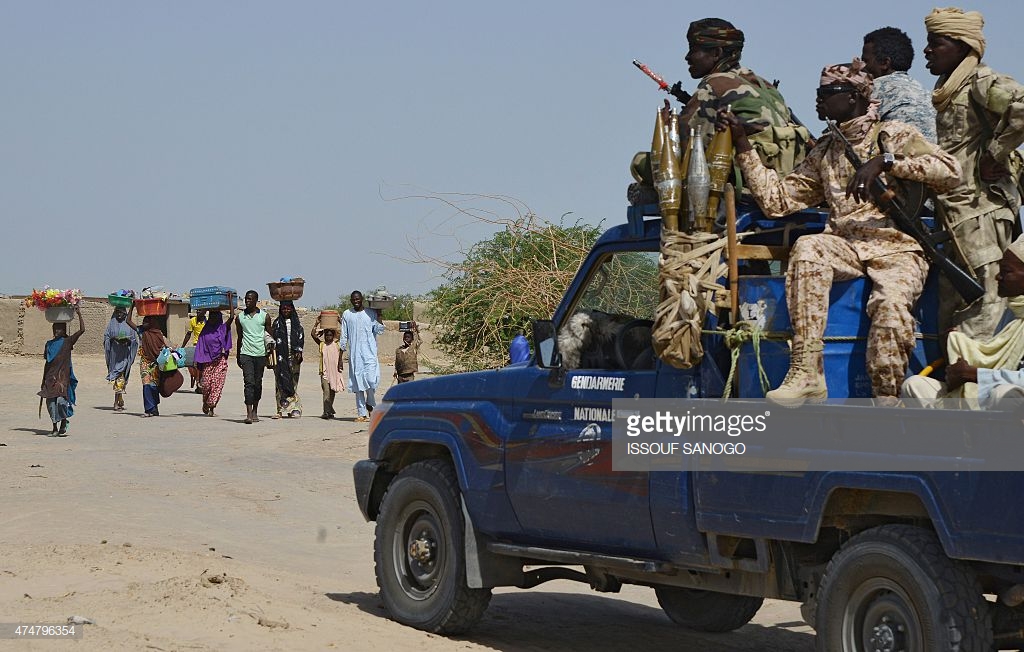
People from the Nigerian town of Malam Fatori an its area, close to the borders with Niger and Chad, pass by a car with Chadian Gendarmes (in uniform) as they flee Islamist Boko Haram attacks to take shelter in the Niger's town of Bosso secure by Niger and Chad armies, on May 25, 2015. Boko Haram, which wants to create a hardline Islamic state in northeast Nigeria, has been pushed out of captured towns and territory since February by Nigerian troops with assistance from Niger, Chad and Cameroon. AFP PHOTO / ISSOUF SANOGO (Photo credit should read ISSOUF SANOGO/AFP/Getty Images)
…Seven suspects were arrested
No fewer than 17 teenage girls as well as two babies were rescued by troops of the Nigerian after raiding a baby-making factory in Adamawa State, near Cameroon borders arresting seven suspects in the process.
Reports said that the suspects were apprehended during the operation last week and were paraded at the Army headquarters on Saturday.
The suspects were said to be operating a brothel, human trafficking joint and baby-making factory.
The Brigade Commander, 23 Armoured Brigade Yola, Major General Mohammed Jibrin-Gambo paraded the suspects on Saturday at the brigade headquarters in Yola, the Adamawa State capital.
According to him, troops of the brigade were in a special operation on the border area between Nigeria and Cameroon, and upon credible information, stormed the enclave of criminals at the outskirts of Kasingila village in Maiha Local Government Area of Adamawa.
The suspects, he stated, were apprehended in a border settlement less than a kilometre from the Belel district, the last community before entering the Cameroon Republic.
The operation involved a joint team of security forces who rescued 17 girls between the ages of 19 to 21 years and two babies.
Addressing journalists, the leader of the camp, Abubakar Abdullahi said he got the girls from Adamawa, Gombe and Borno States where he established the camp used as a dance club, prostitution and sales of babies delivered by the girls within Nigeria and across the border of Cameroon.
The rescued girls said to have been in the camp for about two to three years, were recruited as minors and brought to the camp without the knowledge of their families.
Some of the victims said they were accommodated in a single room and slept on mats. They also claimed that the money realized was held back by their captors so that they cannot escape.
The girls were also used to perform during wedding occasions and naming ceremonies within Nigeria and Cameroon, mostly among criminal gangs operating in the area.
Investigation revealed a proliferation of such camps is prominent in the border areas where human trafficking has been on the rise.
It is therefore expected that the National Agency for the Prohibition of Trafficking in Persons (NAPTIP) will curb this ugly trend in the nearest future.




analizador de vibraciones
Equipos de calibración: esencial para el operación uniforme y productivo de las dispositivos.
En el mundo de la innovación actual, donde la productividad y la seguridad del sistema son de alta relevancia, los aparatos de ajuste cumplen un función crucial. Estos aparatos especializados están diseñados para calibrar y regular partes dinámicas, ya sea en dispositivos industrial, automóviles de transporte o incluso en aparatos caseros.
Para los especialistas en reparación de sistemas y los profesionales, trabajar con sistemas de equilibrado es esencial para asegurar el funcionamiento fluido y estable de cualquier mecanismo dinámico. Gracias a estas alternativas modernas innovadoras, es posible minimizar significativamente las vibraciones, el zumbido y la carga sobre los sujeciones, prolongando la tiempo de servicio de elementos valiosos.
Asimismo importante es el papel que cumplen los equipos de balanceo en la atención al usuario. El soporte especializado y el reparación regular usando estos sistemas posibilitan ofrecer prestaciones de excelente estándar, incrementando la bienestar de los consumidores.
Para los dueños de emprendimientos, la contribución en sistemas de calibración y medidores puede ser importante para optimizar la efectividad y rendimiento de sus dispositivos. Esto es particularmente importante para los dueños de negocios que gestionan pequeñas y modestas organizaciones, donde cada aspecto cuenta.
También, los dispositivos de calibración tienen una extensa uso en el sector de la prevención y el monitoreo de calidad. Habilitan localizar eventuales problemas, evitando reparaciones elevadas y perjuicios a los aparatos. Más aún, los datos obtenidos de estos equipos pueden emplearse para optimizar procedimientos y mejorar la reconocimiento en motores de exploración.
Las campos de aplicación de los dispositivos de calibración incluyen numerosas industrias, desde la elaboración de transporte personal hasta el control de la naturaleza. No interesa si se trata de grandes manufacturas industriales o pequeños espacios hogareños, los sistemas de equilibrado son indispensables para asegurar un operación óptimo y sin riesgo de detenciones.
I have learned some new points from your web-site about computer systems. Another thing I have always imagined is that computers have become something that each household must have for most reasons. They offer convenient ways to organize the home, pay bills, search for information, study, tune in to music and also watch tv programs. An innovative way to complete these tasks is to use a laptop computer. These desktops are mobile, small, powerful and portable. Try to Visit My Web Site : LOKABET88